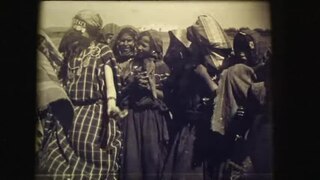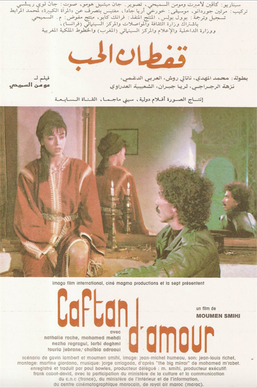Related Research Articles
Mohamed Chouikh is an Algerian film-maker and actor.
Zeka Laplaine, sometimes credited as José Laplaine, is a director and actor from Ilebo in the Democratic Republic of the Congo. The child of a Portuguese father and Congolese mother, he moved to Europe when he was 18. His 1996 short film Le Clandestin was featured at the 2010 Amakula International Film Festival in Uganda. He portrayed a cowboy alongside Danny Glover in Death in Timbuktu, a film within a film in the Council of Europe Film Award-winning film, Bamako. Laplaine is a member of France's "Guilde Africaine des Realisateurs et Producteurs".
Souheil Ben-Barka is a Moroccan film director, screenwriter and film producer. He directed seven films between 1974 and 2002. His 1975 film La guerre du pétrole n'aura pas lieu was entered into the 9th Moscow International Film Festival. His 1983 film Amok won the Golden Prize at the 13th Moscow International Film Festival. In 1987 he was a member of the jury at the 15th Moscow International Film Festival.
The Higher Institute Of Cinema, also known as the Cairo Higher Institute of Cinema, Cairo Higher Film Institute, and other variants, is a film school in Cairo, Egypt. It is one of several institutes making up the Academy of Arts.

Zohra is a 1922 silent 35 mm short film from Tunisia by Albert Samama ('Chikly'). It was the first indigenous North African film production. The movie script was written by Chikly's daughter, Haydée Chikly, who also edited and starred as the key female protagonist in the film.

Raymond Rajaonarivelo is a Malagasy film director.
Lanciné Diabi is an Ivorian filmmaker.
Pierre-Marie Dong (1945-2006) was a Gabonese film director, who was also Minister of Culture in Gabon at the end of his life. Along with Charles Mensah and Simon Augé, Dong "is considered the pioneer of Gabonese film".
Jean-Michel Tchissoukou (1942-1997) was a Congolese filmmaker.
Abdellah Rezzoug or Abdella Zarok was a Libyan filmmaker. In the early 1970s he made the first Libyan feature film, When Fate Hardens.
Philippe Mory was a Gabonese actor and director, born in 1935 and died on 7 June 2016 in Libreville, Gabon. He is known for acting in the film The Cage, One Does Not Bury Sunday (1960) and directing Les tam-tams se sont tus (1972).
Bassek Ba Kobhio is a Cameroonian filmmaker, writer and founder of the Ecrans Noirs film festival in Yaounde, Cameroon. He is also the Director of the Higher Institute of Cinema and Audiovisual Professionals of Central Africa (ISCAC) in Yaounde, the first-ever tertiary training institution for cinematography in the Central Africa sub-region.
Charles Mensah was a Gabonese filmmaker, screenwriter and production manager. Popularly known as "The Gentleman of African Cinemas", Mensah contributed in several critically acclaimed documentaries including Équateur, Les Couilles de l'éléphant and Lybek, the crunch of the alive. He worked as an activist for the development of independent southern cinema for a career spanned more than three decades.
Tom Ribeiro is a Ghanaian writer and director. He wrote and directed several Ghanaian movies made in the post-colonial era, mainly under the production rights of the Ghana Film Industry Corporation (GFIC), which was set up by Osagyefo Dr Kwame Nkrumah. These movies included Genesis Chapter X (1977), Dede (1992), Set on Edge (1999) The Visitor (1983), Out of Sight, Out of Love (1983), Rituals of Fire and The Village Court.
Komany is a 1989 Moroccan film directed by Nabyl Lahlou.
Al Kanfoudi is a 1978 Moroccan film directed by Nabyl Lahlou. The film was one of Lahlou's few projects to receive CCM funding.
The Soul That Brays is 1984 Moroccan film directed by Nabyl Lahlou.

Caftan d'Amour (English: Caftan of Love or The Big Mirror) is a 1987 Moroccan film directed by Moumen Smihi.
Latif Lahlou is a Moroccan filmmaker.
Roy Armes is a British professor emeritus and film scholar who has written numerous books on the history of filmmaking and select filmmakers.
References
- 1 2 3 Douglas A. Yates (28 December 2017). "Cinema". Historical Dictionary of Gabon. Rowman & Littlefield Publishers. pp. 119–. ISBN 978-1-5381-1012-6.
- ↑ Diawara, Manthia (1992). African Cinema: Politics & Culture . Indiana University Press. pp. 62–63. ISBN 0-253-20707-X.
- 1 2 Roy Armes (2006). African Filmmaking: North and South of the Sahara . Indiana University Press. p. 46. ISBN 0-253-21898-5.
- ↑ David E. Gardinier (2012). "Dabany, Patience". In Emmanuel Kwaku Akyeampong; Henry Louis Gates Jr (eds.). Dictionary of African Biography. OUP USA. pp. 147–48. ISBN 978-0-19-538207-5.
- ↑ Roy Armes (2008). "Dong, Pierre-Marie". Dictionary of African Filmmakers. Indiana University Press. p. 94. ISBN 0-253-35116-2.
- ↑ Imunga Ivanga, The revival of Gabonese cinema, Revue Africultures, Vol. 36, 2001.
- ↑ Roy Armes (2008). "Ivanga, Imunga". Dictionary of African Filmmakers. Indiana University Press. pp. 78–79. ISBN 0-253-35116-2.
- ↑ Annelies Hickendorff (2014). Gabon. Bradt Travel Guides. p. 21. ISBN 978-1-84162-554-6.
- ↑ Roy Armes (2008). "Koumba-Bibidi, Henri-Joseph". Dictionary of African Filmmakers. Indiana University Press. p. 85. ISBN 0-253-35116-2.
- ↑ Douglas A. Yates (28 December 2017). "Ivanga, Imunga (1967-)". Historical Dictionary of Gabon. Rowman & Littlefield Publishers. p. 254. ISBN 978-1-5381-1012-6.
- ↑ African cinema makes a comeback, but Hollywood gets top billing, Arab News, 1 November 2017.